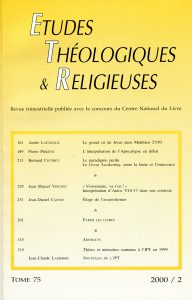Auteur de plusieurs ouvrages sur l’histoire du protestantisme et sur le monde anglophone, Bernard Cottret s’interroge ici sur le réveil américain du XVIIIe siècle dans la constitution d’une identité évangélique distincte. À la suite des travaux de Jean Delumeau, il met ainsi l’accent sur le double rôle du péché et du repentir dans cette « pastorale de la peur », de Jonathan Edwards à George Whitefield, non sans signaler les réticences de John Wesley devant la doctrine de la réprobation. Une contribution paradoxale aux débats théologiques passionnés qui secouent l’Amérique, à la veille de l’Indépendance.
Paradigm Lost : the Great Awakening, from sin to innocence. The great American revival of the mid eighteenth-century was marked by renewed emphasis on original sin and transgression. Guilt, fear, repent and conversion are the ingredients of that religious correctness which challenged the authority of well established ministers. Taking as a reference J. Edwards’Great Christian Doctrine of Original Sin Defended (1758), the author examines the interplay between guilt and innocence, knowledge and experience in the age of the Enlightenment, a few decades before the American revolution. Taking up the opposition between Old and New Testament, and raising wild millenial expectations, the American Great Awakening is largely an interpretative myth, emphasizing the missionary role of the New World and its manifest destiny. Though they disagreed on the universality of salvation, George Whitefield, and to a lesser degree John Wesley, the English founders of methodism, were influenced by the new evangelical spirit. Tocqueville himself in his seminal study of democracy showed how the new Homo Americanus was another Adam revisited.
p. 211-228
Auteur
COTTRET Bernard
Bernard COTTRET (1951-2020) a été professeur de civilisation des îles britanniques et de l'Amérique coloniale à l'université de Versailles-Saint-Quentin-en-Yvelines, membre de l'Institut universitaire de France et de l'Institut de Recherches sur les Civilisations de l'Occident Moderne (IRCOM).
